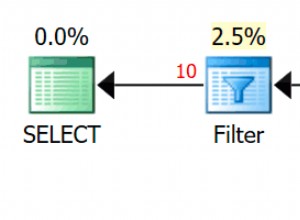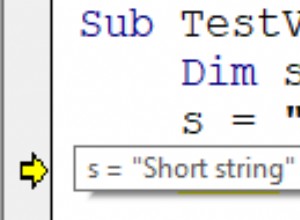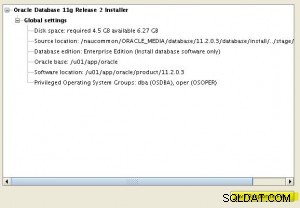Je viens de résoudre un problème comme le vôtre. Il y a peu d'informations à ce sujet. Comme l'a dit @ ms03 ... la meilleure façon est de créer un nouveau type et une classe qui implémente ce type et gère l'objet java pour définir/accéder à la base de données.
D'abord sur votre entité, vous devez déclarer des types pour vos paramètres.
@Entity
@Table(name="user_app")
@TypeDefs(value={@TypeDef(name="convertInet",typeClass=PgInetType.class),
@TypeDef(name="convertMacaddr",typeClass=PgMacaddrType.class)})
public class User implements Serializable {
//some parameters
@Type(type="convertMacaddr")
private PgMacaddr mac;
@Type(type="convertInet")
private PgInet ip;
//getters and setters, equals, hashcode, toString
}
Deuxièmement, créez le nouvel objet géré pour Java, il doit avoir une construction par défaut, une construction pour gérer les données de la base de données et être sérialisable.
public class PgInet implements Serializable {
private static final long serialVersionUID = 1L;
private String address;
public PgInet(String address){
this.address=address;
}
public PgInet(){
this.address=null;
}
//Getters,setters,hashcode, equal and toString
}
Et dernière étape, vous devez créer un type personnalisé
public class PgInetType implements UserType{
@Override
public int[] sqlTypes() {
//Because inet,macaddr,cdir...and unkwon type for java, yo must
// define Types.OTHER
return new int[] { Types.OTHER };
}
@Override
public Class returnedClass() {
//Object created to be handled for java
return PgInet.class;
}
@Override
public boolean equals(Object x, Object y) throws HibernateException {
return ObjectUtils.nullSafeEquals(x, y);
}
@Override
public int hashCode(Object x) throws HibernateException {
if(x!=null)
return x.hashCode();
else
return 0;
}
@Override
public Object nullSafeGet(ResultSet rs, String[] names,
SessionImplementor session, Object owner)
throws HibernateException, SQLException {
//Translation from DB to Java
PgInet address=null;
String ip=rs.getString(names[0]);
if(ip!=null){
address=new PgInet(ip);
}
return address;
}
@Override
public void nullSafeSet(PreparedStatement st, Object value, int index,
SessionImplementor session) throws HibernateException, SQLException {
//Translation from java to DB
if(value==null){
st.setNull(index, Types.VARCHAR);
}else{
//As inet,macaddr,cdir...are new types object on Postgresql you must
//create the specific postgresql object and to insert it
//I created 2 new cast on postgresql: inet As varchar, varchar AS inet
//but I think it's not neccesary because macaddr type works fine without
//postgresl casting
st.setObject(index, getInet(value, st.getConnection()));
}
}
private Object getInet(Object value, Connection connection) {
//Expected object on postgresql
Object tempInet = null;
ClassLoader connectionClassLoader = connection.getClass().getClassLoader();
try {
//Class which will create the postgresql
Class aPGObjectClass =connectionClassLoader.loadClass("org.postgresql.util.PGobject");
Constructor ct = aPGObjectClass.getConstructor(null);
try {
tempInet = ct.newInstance(null);
} catch (InstantiationException | IllegalAccessException
| IllegalArgumentException | InvocationTargetException e2) {
// TODO Auto-generated catch block
e2.printStackTrace();
}
Method setTypeMethod = aPGObjectClass.getMethod("setType", new Class[]{String.class});
try {
//Setting postgresql type, inet in this case
setTypeMethod.invoke(tempInet, new Object[]{"inet"});
} catch (IllegalAccessException | IllegalArgumentException
| InvocationTargetException e1) {
// TODO Auto-generated catch block
e1.printStackTrace();
}
Method setValueMethod = aPGObjectClass.getMethod("setValue", new Class[]{String.class});
try {
setValueMethod.invoke(tempInet, new Object[]{value.toString()});
} catch (IllegalAccessException | IllegalArgumentException
| InvocationTargetException e) {
// TODO Auto-generated catch block
e.printStackTrace();
}
} catch (ClassNotFoundException e) {
} catch (NoSuchMethodException e) {
// TODO Auto-generated catch block
e.printStackTrace();
} catch (SecurityException e) {
// TODO Auto-generated catch block
e.printStackTrace();
}
return tempInet;
}
@Override
public Object deepCopy(Object value) throws HibernateException {
if(value==null)
return null;
else{
PgInet PgInetNew=new PgInet();
PgInet PgInetOriginal=(PgInet)value;
PgInetNew.setAddress(PgInetOriginal.getAddress());
return PgInetNew;
}
}
@Override
public boolean isMutable() {
return false;
}
@Override
public Serializable disassemble(Object value) throws HibernateException {
Object deepCopy=deepCopy(value);
if(!(deepCopy instanceof Serializable))
return (Serializable)deepCopy;
return null;
}
@Override
public Object assemble(Serializable cached, Object owner)
throws HibernateException {
return deepCopy(cached);
}
@Override
public Object replace(Object original, Object target, Object owner)
throws HibernateException {
return deepCopy(original);
}
}
Cette méthode fonctionne bien pour moi lorsque j'insère ou récupère une ligne de DB.




